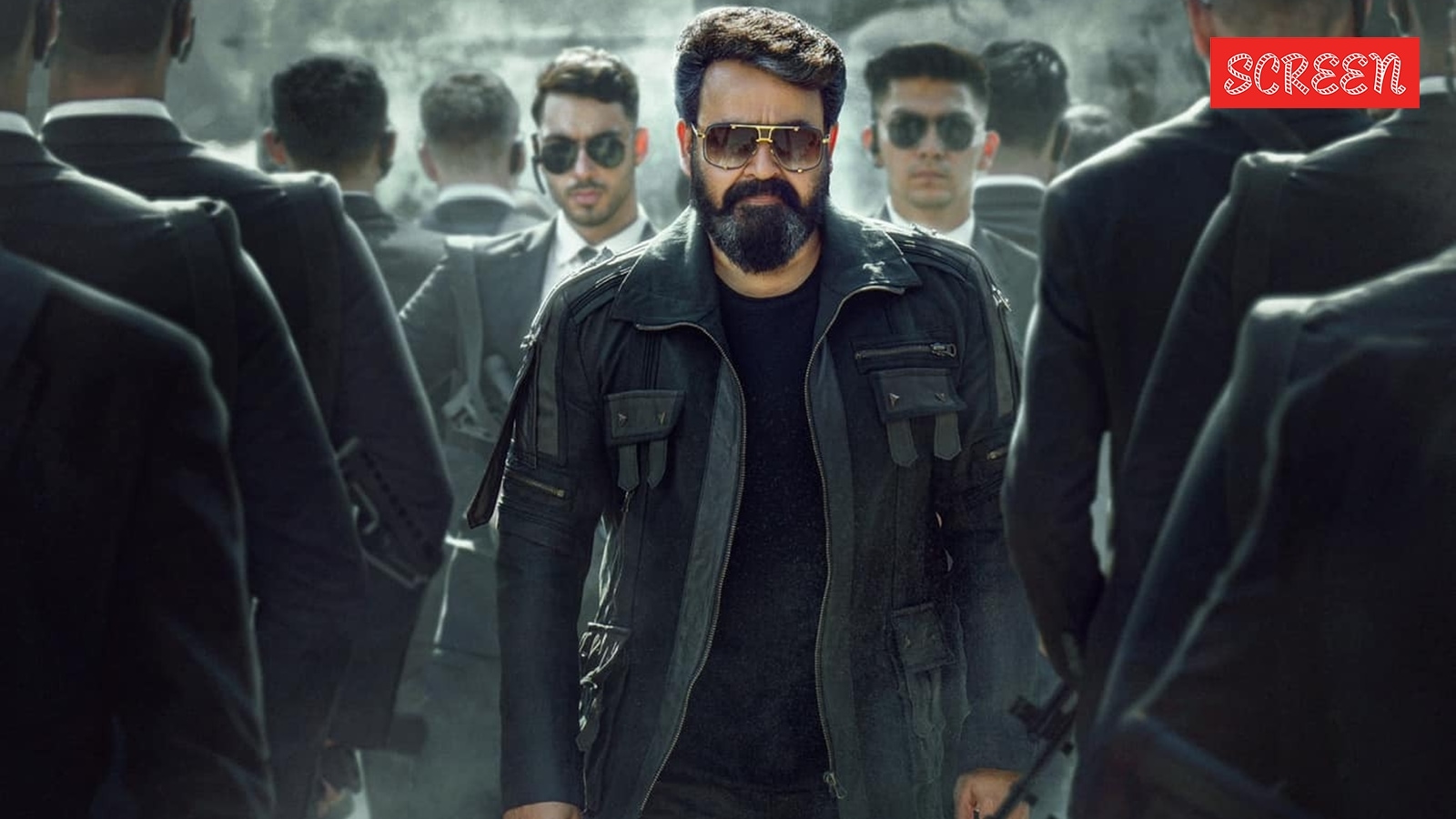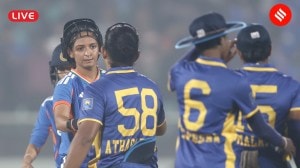
Empuraan Movie Box Office Live Updates: Mohanlal’s film gets ‘earth-shattering’ response
Set about five years after the events of Lucifer, Empuraan’s core conflict is summed up in Stephen’s words: “When the son of God himself succumbs to sin, who else is there to rely upon but the Devil?” After Stephen’s departure from his homeland, entrusting the leadership of his party IUF and the state of Kerala to his political godfather PK Ramdas’ (Sachin Khedekar) son Jathin (Tovino Thomas), everything was stable at first.
However, over time, Jathin — now Kerala’s CM — becomes intoxicated by power and wealth, leading him down a path of corruption. As allegations mount, he seeks refuge in an alliance with a national party notorious for its far-right ideology and divisive politics, hoping to clear his name. But in doing so, he also opens Kerala’s doors to the Hindutva-driven Akhanda Shakti Morcha (ASM) and its ruthless leader Balraj Patel alias Baba Bajrangi (Abhimanyu Singh). Together, they also make a massive move in Stephen’s Nedumpally constituency — one that could upend the lives of commoners, particularly the tribals. Though Ramdas’ elder daughter Priyadarshini (Manju Warrier) is against this, she finds herself powerless against her domineering brother.
Watch Empuraan trailer here:
As Kerala faces the looming threat of being consumed by a force fuelled by corruption and communal politics — and with God nowhere to be found — there is only one hope: the return of Lucifer. Will the mafia don Khureshi Ab’raam — now living far removed from this chaos — step back into the scene, clad in a dhoti and with his moustache twirled, set to fearlessly challenge his rivals with a single word: “Vaada (Come)”?
Unlike Lucifer, where the first act was dedicated to establishing characters, their dynamics and their stakes in the battle, Empuraan opens with an extended flashback, shedding light on the past of Khureshi’s confidant Zayed Masood (Prithviraj), orphaned during the 2002 Gujarat pogrom — an atrocity directly linked to Balraj. Interestingly, Zayed’s backstory unfolds with a focus on drama and emotional depth rather than mere spectacle. In contrast to typical pan-Indian action entertainers that use every moment in the first act to hype up the male lead or showcase their over-the-top stunts, Empuraan remains grounded, with absolute focus on world-building and storytelling.
Story continues below this ad
While the sequence is intensely violent, Prithviraj exercises restraint in depicting brutality, avoiding excessive gore that could feel gratuitous or overly distressing. One particularly harrowing moment features Balraj’s men attacking a pregnant Muslim woman — a chilling reminder of the Naroda Patiya massacre, where a similar atrocity was reported. This moment also makes it evident that Abhimanyu Singh’s character being named “Baba Bajrangi” was no coincidence. However, rather than depicting the violence against the woman explicitly, Prithviraj relies on powerful visual storytelling, making the audience feel the horror without showing it directly.
Through this gut-wrenching sequence, Prithviraj and writer Murali Gopy establish two crucial elements: that Balraj is an even more merciless antagonist than Lucifer’s Bobby (Vivek Oberoi) and that the characters’ past holds significant weight in Empuraan’s conflicts.
Murali’s script here, however, reduces the entire episode to a mere case of “one (or more) power-hungry politician’s greed”, unfairly erasing its communal dimension, thus suggesting that religious bigotry is almost non-existent and failing to acknowledge the event as ethnic cleansing. As the narrative moves forward, Murali also struggles to maintain the dramatic tension, and the writing takes a noticeable dip, which only worsens as the film progresses.
With the introduction of the present-day dynamics between the Khureshi-Ab’raam nexus and its rival, the Shen Triad, Empuraan expands into the global landscape of organised crime, even bringing intelligence agencies like MI6 into the mix. From this point on, Prithviraj’s skill as a director in orchestrating large-scale visuals becomes apparent. The film consistently reinforces his earlier claim that a significant portion of Empuraan’s budget was spent on production rather than actor remunerations, setting it apart from most pan-Indian films. Despite the grandeur, nothing feels excessive or out of place either, and Prithviraj maintains tight control over the movie, ensuring that the scale enhances rather than overwhelms the story.
Story continues below this ad
Even then, Khureshi’s entry is deliberately (and brilliantly) delayed. By frequently shifting between the escalating turmoil in Kerala and the rising tension in the crime world, the film effectively builds anticipation. This slow burn helps in creating an eagerness in the audience for his return. And then, at long last, Lucifer makes his grand entrance, delivering the adrenaline rush that had been simmering for nearly an hour.
However, the emotional depth and dramatic weight that anchored Lucifer are largely absent in Empuraan. While the visuals are undeniably impressive, a closer look at the storytelling raises the question: to what end? Even in the Kerala-set sequences, there is a noticeable lack of honesty in the narrative, with most characters feeling either out of character or robotic, except for the truth-seeker Govardhan (Indrajith Sukumaran) and Stephen’s trusted aide Muthu (Murugan Martin).
This lack of depth also impacts the film’s high points, particularly the nighttime forest fight sequence, which could have benefitted from stronger buildup. That’s not to say the scene completely falters — it is ultimately salvaged by Prithviraj’s visual craftsmanship and Mohanlal’s commanding presence. A striking example is a shot where the flames from a burning tree behind Stephen momentarily form what appears to be fiery horns sprouting from his head, lending him an almost Satanic aura, reminiscent of a similar frame in Mammootty’s Vidheyan (1994). While the visuals and Mohanlal’s screen presence reach their peak here, the narrative buildup, background score and action choreography fail to match that intensity. The interval block, though well-executed, falls short of being truly iconic again due to a lack of impactful lead-up.
As in Lucifer, the women in Empuraan remain mere pawns in a male-dominated narrative, acting only as per the instructions of the men around them. Even when Priyadarshini eventually asserts herself as a political force, the moment lacks the emotional weight it aims for, due to weak character development. Another defining strength of Lucifer was its ability to give every character, no matter how small, a distinct identity. Empuraan, however, struggles in this regard and even Khureshi feels underdeveloped, let alone “main” characters like Sajanachandran (Suraj Venjaramoodu), Boris Oliver (Jerome Flynn), Kabuga (Eriq Ebouaney) and Jhanvi (Saniya Iyappan). Ironically, the only person with a fully realised arc is Zayed, which feels odd, given that the story isn’t his to carry. Meanwhile, those with significant stakes in the unfolding events are sidelined, diminishing the narrative further.
Story continues below this ad
 Empuraan is the second instalment in a planned trilogy that commenced with actor Prithviraj Sukumaran’s directorial debut Lucifer. (Credit: Facebook/@AashirvadCinemasOfficial)
Empuraan is the second instalment in a planned trilogy that commenced with actor Prithviraj Sukumaran’s directorial debut Lucifer. (Credit: Facebook/@AashirvadCinemasOfficial)
Empuraan is certainly not another run-of-the-mill pan-Indian movie that exists solely to scream “look what our star can do!” It indeed has a well-thought-out core, layered with subtext, comprising political undertones too. Although Prithviraj proves his skill as a master of spectacle, his storytelling (as a director) falls short as he struggles to compensate for the film’s lack of a strong narrative. The movie’s technical brilliance, bolstered by Sujith Vaassudev’s stunning cinematography, is commendable. However, its excessive runtime and unnecessary prolonging of sequences weigh it down, making a tighter trim a missed opportunity. Akhilesh Mohan’s editing is decent, but the action sequences suffer from a lack of organic flow, with too many cuts diminishing their impact. The colour grading also appears artificial in places, particularly in scenes set in African locations like Senegal. Stunt Silva’s action choreography is underwhelming as well, though not as much as Deepak Dev’s uninspired background score, which is one of the film’s most glaring weaknesses. The absence of a truly electrifying score has significantly diminished Empuraan’s dramatic and massy impact.
Despite these shortcomings, it is Mohanlal’s commanding presence that prevents the film from slipping into monotony. Even when he is off-screen, his presence is felt; and when he finally appears, he commands the frame with effortless charisma. While his character is often shrouded in darkness, with minimal light falling on him, even when fully illuminated, a look at him makes one feel as if they are staring into an abyss, a testament to the Malayalam superstar’s magnetic screen presence. Apart from the somewhat clichéd mafia boss costumes, Mohanlal fully embodies Empuraan, “the flower of darkness that blossomed between the Father and the Son, the Overlord of the dark spheres”.
While Team Lucifer has every reason to proceed with the planned third installment, it is crucial that they reclaim what was lost in the journey from Lucifer to Empuraan, as the film’s underwhelming cameos in the climax won’t be enough to sustain momentum moving forward.
Empuraan movie cast: Mohanlal, Prithviraj Sukumaran, Manju Warrier, Tovino Thomas, Abhimanyu Singh, Jerome Flynn
Empuraan movie director: Prithviraj Sukumaran
Empuraan movie rating: 3 stars




 Empuraan is the second instalment in a planned trilogy that commenced with actor Prithviraj Sukumaran’s directorial debut Lucifer. (Credit: Facebook/@AashirvadCinemasOfficial)
Empuraan is the second instalment in a planned trilogy that commenced with actor Prithviraj Sukumaran’s directorial debut Lucifer. (Credit: Facebook/@AashirvadCinemasOfficial)































